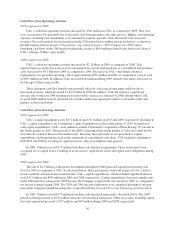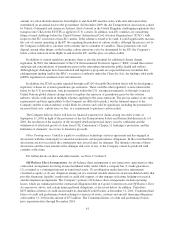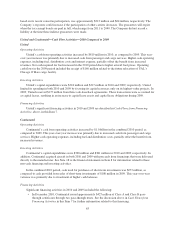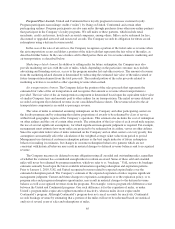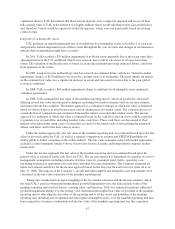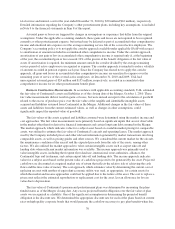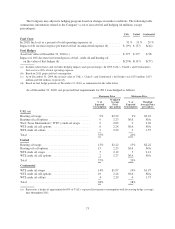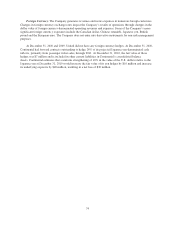United Airlines 2010 Annual Report Download - page 66
Download and view the complete annual report
Please find page 66 of the 2010 United Airlines annual report below. You can navigate through the pages in the report by either clicking on the pages listed below, or by using the keyword search tool below to find specific information within the annual report.• In August 2010, Continental issued $800 million aggregate principal amount of 6.75% Senior Secured
Notes due 2015. In conjunction with the issuance of these notes, Continental repaid its $350 million
senior secured term loan credit facility that was due in June 2011. See Note 14 to the financial
statements in Item 8 for additional information related to this financing.
• In November 2009, Continental obtained financing for eight currently-owned Boeing aircraft and
eleven new Boeing aircraft through an EETC financing, which included $528 million aggregate
principal amount of Class A certificates that bear interest at 7.25% and $117 million aggregate
principal amount of Class B certificates that bear interest at 9.25%. The obligation for this financing
was recorded as debt in 2010 when the aircraft were delivered. The financing requires periodic
principal and interest payments with final payments due in 2019 in the case of the Class A certificates
and final payments due in 2017 in the case of the Class B certificates.
• In December 2009, Continental issued $230 million in principal amount of 4.5% Convertible Notes due
2015. See Note 14 to the financial statements in Item 8 for additional details related to this financing.
• In August 2009, Continental completed a public offering of 14 million shares of Class B common stock
at a price to the public of $11.20 per share, raising net proceeds of $158 million for general corporate
purposes.
• In July 2009, Continental obtained financing for 12 currently owned Boeing aircraft and five new
Boeing aircraft through a $390 million EETC financing, which bears interest at 9%. The proceeds of
the financing were used for general corporate purposes and to acquire new aircraft.
Critical Accounting Policies
Critical accounting policies are defined as those that are affected by significant judgments and uncertainties
which potentially could result in materially different accounting under different assumptions and conditions. The
Company has prepared the financial statements in conformity with GAAP, which requires management to make
estimates and assumptions that affect the reported amounts in the financial statements. Actual results could differ
from those estimates under different assumptions or conditions. The Company has identified the following
critical accounting policies that impact the preparation of the financial statements.
Passenger Revenue Recognition. The value of unused passenger tickets and miscellaneous charge orders
(“MCOs”) is included in current liabilities as advance ticket sales. The Company records passenger ticket sales
and tickets sold by other airlines for use on United and Continental as passenger revenues when the
transportation is provided or upon estimated breakage. The Company records an estimate of breakage revenue for
tickets that will expire in twelve months without usage at departure date. The Company records an estimate of
tickets that have been used, but not recorded as revenue due to system processing errors, as revenue in the month
of sale based on historical results. Due to complex industry pricing structures, refund and exchange policies and
interline agreements with other airlines, certain amounts are recognized as revenue using estimates both as to the
timing of recognition and the amount of revenue to be recognized. These estimates are based on the evaluation of
actual historical results.
Tickets sold by other airlines are recorded at the estimated values to be billed to the other airlines.
Non-refundable tickets generally expire on the date of the intended flight, unless the date is extended by
notification from the customer on or before the intended flight date. Fees charged in association with changes or
extensions to non-refundable tickets are recorded as other revenue at the time the fee is collected. Change fees
related to non-refundable tickets are considered a separate transaction from the air transportation because they
represent a charge for the Company’s additional service to modify a previous sale. Therefore, the pricing of the
change fee and the initial customer reservation are separately determined and represent distinct earnings
processes. Refundable tickets expire after one year. MCOs can be exchanged for a passenger ticket. The
Company estimates the amount of MCO breakage revenue based on historical experience.
See Note 3 to the financial statements in Item 8 for additional information related to accounting standards
impacting revenue recognition that have been issued, but not yet adopted by the Company.
64




